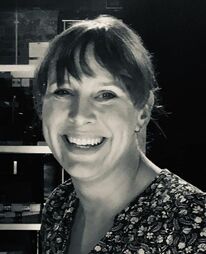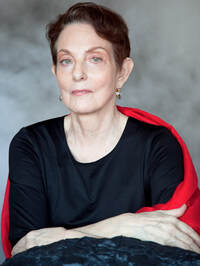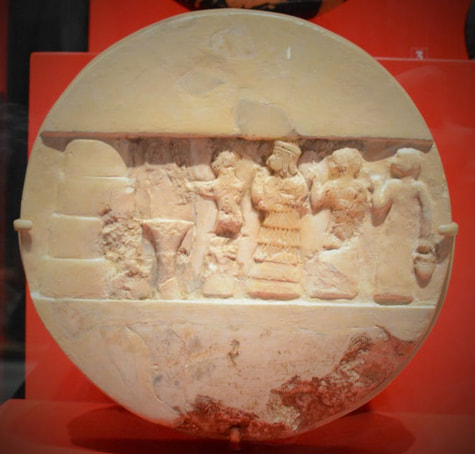Written by Yvonne Inall |
||||||||||||||||||||||||||||||||||||
| ...Seeing the positive side of things, the pandemic has allowed me to participate, from Spain, in an event held in Sydney, which demonstrates our resilience in the face of adversity. I am fascinated by the number of participants, the number of presentations, the organisation and the interaction you have made possible. Amazing! I had an amazing time at the conference and met some wonderful, insightful, and passionate individuals. And I’ll readily attend the next conference. I want to thank you for the great organization of the conference. It was something beautiful in these troubled times. |
This article was first published Y. Inall, 'Modern’ Women of the Past?: Unearthing Gender and Antiquity Conference" in AAIA Bulletin 17, 2021. pp.50-51 |
| ||||||
1 Comment
AWAWS Brisbane Chapter presents 'The Cancelled Conference 2.0'
Last year AWAWS Brisbane hosted The Cancelled Conference, and asked postgraduate students to put their cancelled conference papers to good use. The conference was a great success and one of the most rewarding aspects of the conference was the feedback presenting postgraduate students received from senior academics who attended.
This year, in partnership with the AWAWS Academic Mentoring Program, AWAWS Brisbane is hosting The Cancelled Conference 2.0: a postgraduate conference designed to give students the opportunity to receive feedback on their work from established academics who are invested in supporting and fostering postgraduate scholarship.
There will be a number of AWAWS mentors in attendance and chairing the panels. This will ensure every presenter has the opportunity to receive critical and constructive feedback from leading academics in their field. There will also be a plenary discussion panel about the AWAWS Academic Mentoring Program. This session will highlight the benefits of academic mentoring and showcase positive academic outcomes achieved through the program by past mentors and mentees.
Who is this conference for?
Date and Location
The Cancelled Conference 2.0 will be held between Wednesday 29 September – Thursday 30 September 2021.
The conference will be held virtually through Zoom. Once the program has been finalised information on how to register and attend each session will be circulated. Please save the date in the meantime.
Conditions
How to apply
To apply for the conference please send an abstract and your completed submission form to AWAWS Brisbane [email protected] - Submissions are due by Monday 26 July.
This year, in partnership with the AWAWS Academic Mentoring Program, AWAWS Brisbane is hosting The Cancelled Conference 2.0: a postgraduate conference designed to give students the opportunity to receive feedback on their work from established academics who are invested in supporting and fostering postgraduate scholarship.
There will be a number of AWAWS mentors in attendance and chairing the panels. This will ensure every presenter has the opportunity to receive critical and constructive feedback from leading academics in their field. There will also be a plenary discussion panel about the AWAWS Academic Mentoring Program. This session will highlight the benefits of academic mentoring and showcase positive academic outcomes achieved through the program by past mentors and mentees.
Who is this conference for?
- Postgraduate students involved in the AWAWS mentoring program who would like to showcase their work to their mentors, their peers, and the broader community of ancient world studies
- Postgraduate students who are interested in joining the AWAWS mentoring program and would like to see what the mentoring program can do for them
- Postgraduates students seeking critical and constructive feedback from academics in their field
Date and Location
The Cancelled Conference 2.0 will be held between Wednesday 29 September – Thursday 30 September 2021.
The conference will be held virtually through Zoom. Once the program has been finalised information on how to register and attend each session will be circulated. Please save the date in the meantime.
Conditions
- 20 minute paper + 10 minute question time
- Paper submissions are open to all AWAWS postgraduate members: renew or join here.
- There is no set theme for this conference, all topics are welcome
- Audience attendance is free and open to the public
- We stress that the aim of the conference is to support and encourage postgraduate research, and we invite all postgraduates, academics, and industry professionals to attend and share this aim.
How to apply
To apply for the conference please send an abstract and your completed submission form to AWAWS Brisbane [email protected] - Submissions are due by Monday 26 July.
| The Cancelled Conference 2.0 submission form | |
| File Size: | 85 kb |
| File Type: | docx |
If you have any further questions about the conference, you can contact us via our email address or Facebook page.
Email: [email protected]
Facebook: @awawsbrisbane
Conference Convenors
Brianna Sands, MPhil candidate (UQ), Co-chair AWAWS Brisbane Chapter
Tyla Cascaes, PhD candidate (UQ), Co-chair AWAWS Brisbane Chapter
Email: [email protected]
Facebook: @awawsbrisbane
Conference Convenors
Brianna Sands, MPhil candidate (UQ), Co-chair AWAWS Brisbane Chapter
Tyla Cascaes, PhD candidate (UQ), Co-chair AWAWS Brisbane Chapter
'Modern' women of the past? Unearthing gender and antiquity.
AWAWS, AAIA, CCANESA, CCWM and the University of Sydney Departments of Archaeology and Classics & Ancient History are hosting an online conference on Modern Women of the Past? Unearthing Gender and Antiquity, to be held over 5-6 March 2021, ahead of this year's International Women’s Day (8 March 2021).
| The provisional program is now available and features 64 papers delivered by scholars from a dozen different countries around the world. Registration is essential - click here to register. In the week leading up to the conference all registrants will receive access to an online portal for conference announcements and the final booklet featuring abstracts and instructions on how to connect to each session. As part of the conference we are offering two keynote lectures to be as held as online webinars and open to attendees of the conferences and audiences of the co-hosting organisations - read more below and register for these sessions independently of the conference. The final session of the conference will be a publication Q and A with the editors of Liverpool Press' new publication series Women in Ancient Cultures. |
| ||||||
Keynote Lecture
"Women in the present, women in the past" by Dr Rachel Pope
| This keynote provides a perspective from the UK and Europe on how preventing women’s access to academia and the heritage sector, both historically, and in our contemporary workplace culture, has impacted our understanding of women in the past. We discover the irony that, under the banner of objective practice, late twentieth century archaeologists actively erased past women, or wrote them specifically into domestic roles. We investigate the mechanism through which scholars sought to undermine women’s authority in the past, and in the writing too of disciplinary histories, in favour of patriarchal mythmaking, and how that practice lingers on today. We see how a generation of young scholars had to fight to correct this inherited academic problem in archaeological practice, outside the mainstream, and how a new generation of scholars are now working beyond binary, developing applied method in gender archaeology, to discover the past more as it was, and less in our making. |
Speaker: Dr Rachel Pope, Senior Lecturer in European Prehistory, Liverpool University, Founder and a Director of British Women Archaeologists.
When: 7.45pm (AEDT) Friday 5th March
Note: Speaker will be presenting from Liverpool, UK at 8.45am GMT, Friday 5th March.
RSVP: Click here to register via eventbrite
When: 7.45pm (AEDT) Friday 5th March
Note: Speaker will be presenting from Liverpool, UK at 8.45am GMT, Friday 5th March.
RSVP: Click here to register via eventbrite
Keynote Lecture
"Where are the Women in Eternity?" by Professor Gina Walker
| Where are the Women in Eternity juxtaposes the stark reality of millennia of ignorance about earlier female figures and their authority as knowers in the context of sixty years of contemporary Feminist Historical Recovery that ‘Modern’ Women of the Past? Unearthing Gender and Antiquity celebrates. I describe The New Historia initiative which I direct at The New School with a global collaborative of researchers who are producing authoritative “female biographies” of attested female figures on various platforms for new audiences. I ask, does the avalanche of fresh data about women demand new knowledge-ordering systems that for the first time include a female dimension? |
Speaker: Professor Gina Walker, Professor of Women's Studies and Director of The Center for The New Historia, The New School.
When: 9.30am (AEDT) Saturday 6th March
Note: Speaker will be presenting from New York, USA at 5.30pm EST, Friday 5th March.
RSVP: Click here to register via eventbrite
When: 9.30am (AEDT) Saturday 6th March
Note: Speaker will be presenting from New York, USA at 5.30pm EST, Friday 5th March.
RSVP: Click here to register via eventbrite
Contact us
If you have any questions about the conference or our key note lectures you can contact the conference convenors via [email protected]
Call for Papers: Professional Women of the Ancient World - an AWAWS Sponsored Panel for ASCS 42
17/8/2020
‘A woman’s work is never done,’ whether in a Postmodern Pandemic, 1950s Australia or Classical Antiquity. What was that work, however, and when was it considered a ‘profession’ or even ‘work’ in Antiquity (by the worker, her family, and/or her society)? Recent research is casting new light on paid and unpaid work that ancient women undertook outside of the household oikos, domus or villa context in the ancient Mediterranean world. The 10th muse Sappho continues to attract attention (and somehow publish new work!), as do her lesser-known sisters of the lyre and pen like Erinna, Anyte or Sulpicia (1). The ‘working women’ of the oldest profession gain renewed notoriety, whether Aspasia as the ‘secret’ muse of Socrates and originator of western philosophy in Classical Athens (2), or the mostly-anonymous sex workers of Pompeii (3). Even in arts and crafts, we are slowly recognizing the ‘mass production’ of garland weavers, wool-workers (4), or female potters like the potential creator of the Dipylon Vase (5). Major challenges to this sort of scholarship remain, however, not only in the extant literary and archaeological evidence, but also in the unpacking of historic and contemporary gender (and other) biases and stereotypes, value-judgments and judgments of value. Ancient and modern definitions of ‘working women’ were, and are, neither static nor uniform, but worthy of study and questioning, whether of their professionalisation and the earning of wages, their public and private spheres, or across all the disparate categories of paid, unpaid and servile labor, labor, douleia, scholê orneg(otium) of ancient Greece and Rome.
Australasian Women in Ancient World Studies invites the submission of abstracts for a panel at ASCS 42 on professional women of the Ancient World. Abstracts in the ASCS format should be sent in the first instance to the panel convenor Amelia R. Brown at [email protected] by August 21, 2020, so she can prepare a panel submission by August 31 for ASCS 42 Online.
Australasian Women in Ancient World Studies invites the submission of abstracts for a panel at ASCS 42 on professional women of the Ancient World. Abstracts in the ASCS format should be sent in the first instance to the panel convenor Amelia R. Brown at [email protected] by August 21, 2020, so she can prepare a panel submission by August 31 for ASCS 42 Online.
Works cited:
Image sourced from Pryke, L. 'Hidden women of history: Enheduanna, princess, priestess and the world’s first known author' The Conversation. February 13, 2019.
- E. Greene, ed. 2005. Women Poets in Ancient Greece and Rome. Norman, OK. ; E. Greene and M.B. Skinner, eds. 2009. The New Sappho on Old Age: Textual and Philosophical Issues. Washington, DC.
- A. D’Angour. 2019. Socrates in Love: The Making of a Philosopher. London.
- S. Levin-Richardson. 2019. The Brothel of Pompeii: Sex, Class, and Gender at the Margins of Roman Society. Cambridge.
Image sourced from Pryke, L. 'Hidden women of history: Enheduanna, princess, priestess and the world’s first known author' The Conversation. February 13, 2019.
AWAWS Brisbane Chapter presents
The Cancelled Conference
For many postgraduate students the mid-year break is usually a time to attend conferences and workshops to gain academic and professional experience. These events provide great opportunities for postgraduates to share their research ideas, practice public speaking, further their professional development, and meet fellow peers. Due to the unfolding circumstances most conferences and workshops for 2020 have been cancelled or postponed for the foreseeable future. As a postgrad-led chapter we are particularly aware of the impact these cancellations can have on academic development for postgraduate students, especially for new students planning to attend their first conference.
To combat these cancellations and to make the most of our time in isolation, AWAWS Brisbane will be holding The Cancelled Conference to provide AWAWS postgraduate members with an opportunity to put their cancelled conference papers to good use. The conference will be held virtually over Zoom in mid-July. Although we cannot fully recreate or replace attending an academic conference, we hope The Cancelled Conference will be a useful alternative.
Date and Location
The Cancelled Conference will be held Monday 13 – Tuesday 14 July depending on numbers.
The conference will be held virtually through Zoom, UQ’s preferred video-call software.
Zoom links for each panel session will be provided in the conference program.
Conditions
How to apply
To apply for the conference please email AWAWS Brisbane ([email protected]) with the submission form below:
To combat these cancellations and to make the most of our time in isolation, AWAWS Brisbane will be holding The Cancelled Conference to provide AWAWS postgraduate members with an opportunity to put their cancelled conference papers to good use. The conference will be held virtually over Zoom in mid-July. Although we cannot fully recreate or replace attending an academic conference, we hope The Cancelled Conference will be a useful alternative.
Date and Location
The Cancelled Conference will be held Monday 13 – Tuesday 14 July depending on numbers.
The conference will be held virtually through Zoom, UQ’s preferred video-call software.
Zoom links for each panel session will be provided in the conference program.
Conditions
- 20 minute paper + 10 minute question time
- Audience attendance is open to the public
- Paper submissions are open to all AWAWS postgraduate members
- There is no set theme for this conference, all topics are welcome
How to apply
To apply for the conference please email AWAWS Brisbane ([email protected]) with the submission form below:
| the_cancelled_conference_2020_submission_form.docx | |
| File Size: | 23 kb |
| File Type: | docx |
Submissions are due by Friday 19 June.
Contact Information
If you have any further questions about the conference, you can contact us via our email address or Facebook page.
Email: [email protected]
Facebook: @awawsbrisbane
Conference Convenors
Brianna Sands, MPhil candidate (UQ), Co-chair AWAWS Brisbane Chapter
Tyla Cascaes, MPhil candidate (UQ), Co-chair AWAWS Brisbane Chapter
If you have any further questions about the conference, you can contact us via our email address or Facebook page.
Email: [email protected]
Facebook: @awawsbrisbane
Conference Convenors
Brianna Sands, MPhil candidate (UQ), Co-chair AWAWS Brisbane Chapter
Tyla Cascaes, MPhil candidate (UQ), Co-chair AWAWS Brisbane Chapter
Categories
All
Announcements
Conferences
Disablism In AWS
Lectures And Talks
Mentoring Program
Newsletter
Review
About this page
Find all of our latest news and announcements including upcoming events, new research and local chapter updates.
Archives
June 2024
April 2024
January 2024
December 2021
September 2021
July 2021
June 2021
May 2021
April 2021
March 2021
February 2021
September 2020
August 2020
July 2020
June 2020



 RSS Feed
RSS Feed